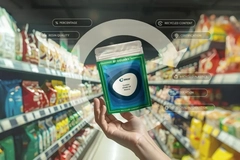
03 Aug 2021 --- Nexe Innovations is launching plant-based, compostable espresso pods in the US and Canada. In an independent composting study, 90 percent of the new pods broke down within 30 days – the same amount of time an apple core requires to decompose.
Nexe maintains these pods are the first company-branded coffee product it is introducing into the single-serve coffee pod market, which the company currently values at over US$25 billion annually.
The espresso blend was made from fair-trade beans grown in Ethiopia, Indonesia and Peru. Nexe posits the blend has a “sweet brown sugar, vanilla, and honey” aroma, as well as a “clean, smooth, juicy, medium body.”
In addition, the coffee has a “sweet, winey, tangy acidity with notes of lemon, orange, nectarine, and heavy chocolate.”

The benefits of in-house production
William Selten, process engineer from Terravis Holding, which conducted the study, maintains the new Nexe espresso pods break down quickly “due to the innovation behind the unique composition and design of the pods.”
The new Nespresso-compatible pods are manufactured locally at Nexe’s British Columbia facility in Canada using environmentally-friendly processes, including 3D printing for prototyping and plant-based materials.
When Nexe Innovations unveiled its Xoma Keto micro-ground coffee pods in April, the company shared with FoodIngredientsFirst that 3D printing saves time and cuts back on waste and emissions by prototyping entirely in-house.
Manufacturing its products in-house also avoids unnecessary delays and shipping costs, according to Nexe, while “controlling recipe development.”
Within 30 days, 90% of the new Nexe espresso pods were broken down in a compostability study.Compostables up-and-coming
Coffee capsules have come under heat in recent years for their weak sustainability profile and single-use reputation.
UK research from compostable coffee pod manufacturer Halo reveals 59 billion standard coffee capsules were produced in 2018, with 56 billion likely to end up in landfills. There, they can take up to 500 years to decompose, leaving behind microplastic contamination.
To curb these enormous amounts of unrecyclable single-use waste, plastic alternative coffee pods have caught industry attention, such as Nespresso’s coffee capsules made with 80 percent recycled aluminum, Lost Sheep Coffee’s wood bark capsules and Melitta’s recycled plastic tea capsules.
However, compostable pods are also becoming increasingly popular, considering recyclable pods often include hard-to-recycle plastic and aluminum.
In February, Xoma and Nexe launched soluble organic MCT coffee in fully compostable capsules. Meanwhile, Lavazza introduced Eco Caps two years ago, a range of compostable coffee capsules in partnership with TerraCycle.
By Anni Schleicher












